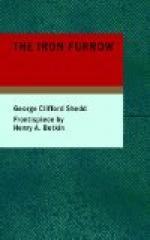She glanced at him. He intended that his words should be taken, she perceived, in a general sense. But the mind always seeks the specific: hers instinctively seized on the particular thorn that had prompted his utterance. Of Ruth Gardner’s extraordinary and inexplicable behaviour she had become informed, like everyone else; it at first amazed, then shocked, and finally outraged her sense of decency. It repelled her—but, then, her early attempts at friendship with the other had never advanced. The girl had always been absorbed in her own doings, immersed in pleasure or in plans for pleasure, concerned entirely with the friends she had, and, unlike Imogene, received Louise’s calls and approaches at cordiality with an indifference that withered all feeling. With the passing of time Louise had considered Lee’s course in relation to the girl as a cause for wonder. The engineer was singularly patient, or incredibly obtuse, or marvellously in love. Whichever it was, her heart stirred with pity. He deserved better, he deserved the best. As for Ruth Gardner, she could now only think of her with a hot resentment that set her lips quivering; and she was moved at moments by a profound desire to express her sympathy to him and to give that warm encouragement his spirit on occasion must need. But she must refrain.
At his speech her conclusions, but not her feelings, underwent a sharp revision. The revelation startled her. He had not been obtuse. He no longer was marvellously in love with Ruth Gardner, nor in love with her at all. Relief followed surprise in her mind, the relief that comes at a fear unrealized, a disaster avoided. Disaster had been precisely what she had sensed if not thought, since a union of two persons whose natures were as utterly different, as essentially opposed, as Lee’s and Ruth’s would inevitably lead to disillusionment, antagonism, sorrow, havoc. That his eyes at last were open was a blessing.
“What are you thinking of?” he asked, all at once.
She found his eyes full upon her.
“Of what you had said,” she responded. “And at this minute I’m speculating on whether anything—one’s decisions, or acts, or sentiments—are ever quite conclusive or final. Or fatal, too, as you said. We might possibly except murder and suicide.” She smiled as she mentioned this reservation.
Lee shifted his position with a trace of impatience.
“I’m not a pessimist,” he exclaimed.
“No, you’re too active to be. Pessimism is at bottom a kind of mental indolence, I’d say—an unpleasant kind.”
“Some matters are not solved by action,” said he. “That is, when they are out of one’s hands and in another’s.”
Her attention was caught by those words, and she hung on them for a little. They distressed her; they caused her to understand the forced immobility of his face as he spoke, and wish that he would give way to his feeling. The phrase “out of one’s hands and in another’s” referred undoubtedly to Ruth Gardner. She did not trust herself to speak.




